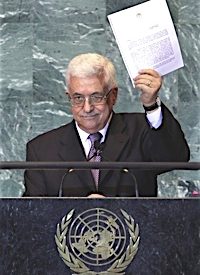
The United Nations is preparing for what is sure to be a contentious showdown, as on September 23 the Palestinians sought recognition from the world body as an independent state. Fox News reports:
Earlier in the week, Palestinian President Mahmoud Abbas rebuffed an intense, U.S.-led effort to sway him from the statehood bid, saying he would submit the application to U.N. chief Ban Ki-moon as planned. A top aide, Mohammed Ishtayeh, said Thursday that Abbas asked Ban and the Council’s Lebanese president this month to process the application without delay. …
To be sure, Abbas’ appeal to the U.N. to recognize Palestinian independence in the West Bank, east Jerusalem and Gaza Strip would not deliver any immediate changes on the ground: Israel would remain an occupying force in those first two territories and continue to severely restrict access to Gaza, ruled by Palestinian Hamas militants.
Abbas told the Palestinians, “We’re going without any hesitation and continuing despite all the pressures. We seek to achieve our right and we want our independent state.”
The demands of Abbas are perceived as confrontational by the United States, which has threatened to veto Palestine’s membership bid in the UN Security Council, asserting that statehood can only be achieved through negotiations between the Palestinians and Israel.
French President Nicolas Sarkozy contends that a U.S. veto of Palestinian statehood could trigger further violence in the region. He urged the United Nations to grant the Palestinians observer state status before reaching a “definitive agreement” in a year’s time.
However, the Palestinians are hoping that by asking for independence at a world forum where a number of nations are sympathetic to their goals, Israel will be in a significantly more difficult position to resist the global pressure.
Fox News provides some background for the request:
In recent weeks, international mediators have been furiously trying to piece together a formula that would let the Palestinians abandon their plan to ask the Security Council for full U.N. membership, and instead make do with the more modest goal of asking a sympathetic General Assembly to elevate their status from permanent observer to nonmember observer state. The other part of that formula would include the resumption of negotiations in short order.
The United States and Israel have pressured the Security Council to either vote against Palestinian independence, or abstain completely from the vote, which requires the support of at least nine of the 15 member nations.
One thing seems certain, however. The odds of Israel and the Palestinians being able to reach an agreement on Palestinian independence via negotiations are slim, as the two sides have been unable to reach any settlement in the past. Israel had made demands that the talks go forward without preconditions; however, the Palestinians insisted that Israel assure them that it would halt the building of any settlements and drop its opposition to basing negotiations on the pre-1967 borders.
Israel had already warned the Palestinians that any appeal to the United Nations would effectively end all negotiations.
Prior to the request of Abbas at the United Nations, President Obama attempted to intervene and convince him not to proceed with the UN appeal. “Peace will not come through statements and resolutions at the UN,” said Obama. He later indicated that he will veto any Palestinian bid for UN membership.
White House National Security Council spokesman Ben Rhodes echoed the President’s statement: “We would have to oppose any action at the UN Security Council including, if necessary, vetoing.”
Israeli Prime Minister Benjamin Netanyahu appeared today at the UN General Assembly and spoke out against Palestine’s bid for statehood:
So far, the Palestinians have refused to negotiate. The truth is that Israel wants peace with the Palestinian state, but the Palestinians want a state without peace. You shouldn’t let that happen. All of these potential cracks in Israeli security have to be sealed in a peace agreement, before a Palestinian state is declared, not afterwards, because if you leave it afterwards, they won’t be sealed, and these problems will explode in our face and explode the peace.
Abbas handed his application to Secretary General Ban Ki-moon this morning. The request now goes to the United Nations Security Council for a vote.
Photo: Palestinian President Mahmoud Abbas holds a letter requesting recognition of Palestine as a state as he addresses the 66th session of the United Nations General Assembly, Sept. 23, 2011: AP Images




